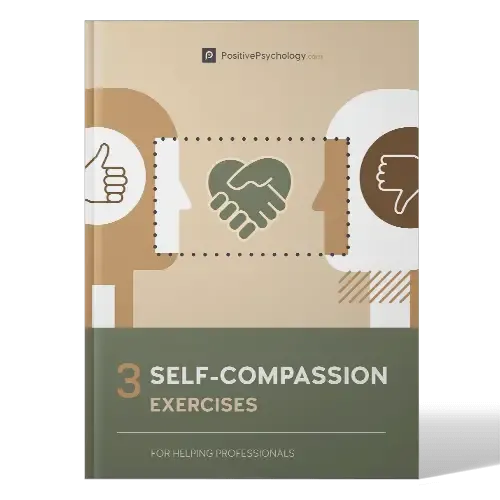13 Self Reflection Worksheets & Templates to Use in Therapy
 The art of reflection is an essential element of learning, both inside and outside therapy.
The art of reflection is an essential element of learning, both inside and outside therapy.
While valuable for clients and students, it is equally vital for therapists, coaches, and mental health professionals.
Literature across multiple disciplines confirms that reflection serves therapists by improving “learning and performance in essential competencies” (Aronson, 2011, p. 200). In therapy, it helps the client “manage personal feelings, such as anxiety and inadequacy, and their impact on others” (Fisher, Chew, & Leow, 2015, p. 736).
This article introduces the basics behind reflection along with questions and worksheets that encourage and support the reflective process and maximize the benefits for therapists, clients, and students.
Before you continue, you might like to download our three Meaning and Valued Living Exercises for free. These creative, science-based exercises will help you learn more about your values, motivations, and goals and will give you the tools to inspire a sense of meaning in the lives of your clients, students, or employees.
This Article Contains:
- Fostering Reflection Skills: The Basics
- 50+ Questions to Ask Your Clients or Students
- 5 Helpful Reflection Worksheets & Tools
- Journaling & Diaries: 2 Useful Templates
- Top 3 Activities for Practicing Reflection
- 3 Fun Games to Inspire Clients
- PositivePsychology.com’s Reflection Resources
- A Take-Home Message
- References
Fostering Reflection Skills: The Basics
While reflection has no single, universal definition, Aronson (2011, p. 200) frames it as the “process of analyzing, questioning, and reframing an experience in order to make an assessment of it for the purposes of learning (reflective learning) and/or improve practice (reflective practice).” It has multiple uses in various contexts.
Reflection is central to most therapies. Indeed, Socratic questioning (using open yet focused questions) is widely used in Cognitive-Behavioral Therapy (CBT) to encourage reflection and unpack deeply held beliefs (Bennett-Levy, Thwaites, Chaddock, & Davis, 2009).
Within therapy, Bennett-Levy et al. (2009) recognized that reflection can be beneficial for both the therapist and the client, and can be considered from several perspectives.
- Reflective practices
Reflection as part of the clinical experience, using journals, video, and group activities. - Reflective skills
The ability to reflect on oneself through therapeutic interaction and self-awareness of feelings and thoughts. - Reflective systems
Reflection results from the interaction of several processes, including the individual’s memory, skills, and reflective system. - Reflective processes
Reflection involves the ability to observe (possibly via visualization) and then reflect or conceptualize to engage in further processing, including elaboration, problem solving, and self-questioning.
Bennett-Levy et al. (2009, p. 121) offer the following helpful definition of reflection:
“Reflection is the process of intentionally focusing one’s attention on a particular content; observing and clarifying this focus; and using other knowledge and cognitive processes (such as self-questioning, logical analysis and problem-solving) to make meaningful links.”
The benefits of reflection carry across to the learning process found within educational environments. It forms the second of the following four-stage model used by coaches engaging with students to understand the learning process (Adams, 2016):
- Attending to and focusing on the relevant features of their experience
- Actively reflecting on their experience
- Extracting learning from that experience
- Planning how to create new ways of behaving in response to the learning
Reflection and learning are also highly applicable outside of school.
While reflection is vital to self-awareness and healing for clients, it is also a powerful and insightful tool for therapists.
Mental health professionals must be self-aware and cognizant of the skills they are using, because “in no other profession does the personality and behavior of the professional make such difference as it does in counseling” (Meier & Davis, 1997).
The following questions can be helpful for new and existing counselors and their clients to increase self-awareness and knowledge of counseling techniques (modified from Bennett-Levy et al., 2009):
- Observe the experience (such as the session or intervention).
How did I feel?
What did I notice? - Clarify the experience.
What did I learn?
Was it helpful?
What did not change?
The following two points are more applicable for therapists:
- Implications of the experience for clinical practice
What are the implications for and impacts on one-to-one therapy, supervision, consultation, etc.? - Implications of the experience for how I see myself as a therapist
What are the implications of this experience for my understanding of cognitive therapy and theory?
Considering each question in turn can provide insights that encourage greater knowledge of the therapeutic process and promote lessons to take forward to future sessions.
50+ Questions to Ask Your Clients or Students

Asking appropriate questions is a crucial aspect of reflection and central to deeper, long-lasting learning (Aronson, 2011; Adams, 2016).
Reflection questions for students
The following three sets of questions promote reflection in students by considering academic performance (modified from ones used by the Colorado Department of Education):
Reflective Questions for personal academic performance
These Reflective Questions prompt the student to think about what they are learning, why they are learning, and how they can improve the overall process.
The student answers the first question regarding what they have been learning and then selects a sample of other questions to prompt reflection.
They then complete the last column with their thoughts for later review by themselves or a therapist, coach, or counselor.
A sample of the questions includes:
What have you been learning about (today, this week, or this semester)?
Why do you think these objectives and this subject are important?
Did you give your best effort on your most recent assignment?
Reflective Metacognition Questions for students
Reflective Metacognition Questions help students reflect on how and what they think.
The questions are grouped under the following subsections and can be answered individually, in pairs, or as a group exercise, with a summary of the answers placed in the final column.
- Reflection and collaboration
- Self-reflection
- Reasoning
- Analysis
Example questions include:
What are your thoughts about what was said?
Are there any other similar answers or alternative answers?
Why do you think this answer is true?
Reflection Questions in Therapy
Reflection is an essential part of therapy.
Using the Reflective Questions in Therapy worksheet, the therapist can encourage and facilitate the process of reflection in the client, such as (Bennett-Levy et al., 2009):
What do I wish people better understood about me?
What behaviors and beliefs do I want to let go of?
Have I been receiving enough support this year?
5 Helpful Reflection Worksheets & Tools
During CBT and other therapies, the client is often given a workbook or journal to capture reflections on the practice or skills they develop as they progress through treatment.
Reflection reinforces learning within the sessions and, more importantly, leads to deeper insights between sessions (Bennett-Levy et al., 2009).
Learning From My Past
The Reflections on Learning From My Past worksheet helps the client capture and reflect on an event from their past and consider how different behavior may have led to an alternate outcome.
The client is asked a series of questions about the incident, such as:
What happened or what was the event?
How did it make you feel?
How did you handle it?
Self-Reflection Behavior Review
At the end of the year or looking back on the client’s life, it can help to look for patterns in behavior.
The Self-Reflection Behavior Review worksheet is a valuable way to summarize events and see the recurring traps into which the client falls.
The summary provides a valuable talking point during therapy sessions and can be referred to later in order to assess how behavior has changed and improved.
It asks the client to consider:
Do you see a pattern in your behavior?
How could you act differently in the future? What situations should you try to avoid?
Who Am I Self-Reflection
In life, we are often so busy with everyday tasks that we forget to take stock of who we are, what we are good at, and what is important to us.
Clients or students can use the Who Am I Self-Reflection worksheet to think about what they are good at, what significant challenges they have been confronted with, and what inspires them.
Some questions to consider include:
Think of something significant that went wrong. What did I learn from it?
What am I passionate about?
What do I love most about myself?
Student Work Reflection
Students can help their existing and future learning by thinking about how they are approaching their work and using metacognitive skills to drive future improvements (Adams, 2016).
The Student Work Reflection is a set of simple repeating questions to consider how they approach each task in school.
It asks the student to consider:
How could I improve?
What am I still working on?
What am I most proud of?
Reflection on Group Activities
Reflection is equally important in group tasks as in individual tasks. The Reflection on Group Activities is for an educational or therapy setting to assess the success and learnings from a group activity.
Working individually or in groups, students can answer questions such as:
What went well?
What did not go well?
What could we try next time?
Journaling & Diaries: 2 Useful Templates

As an intervention, it is a creative way to engage clients in a therapeutic activity, increasing self-awareness and personal growth.
It can be helpful to capture some of the key events of the day. The act of writing what happened and reviewing it later can be insightful and help you recognize positive and negative patterns in your behavior.
Daily Reflection of Feelings
Use the Daily Reflection of Feelings journal with the client to record how their day went and capture the feelings they experienced.
Questions include:
What was the best part of the day?
What would you change about the day if you could?
What are you looking forward to tomorrow?
Daily Reflection of Behavior
Clients and therapists can benefit from reviewing significant events that occurred between sessions.
Use the Daily Reflection of Behavior journal with clients to capture daily behaviors that were unexpected or parts of habits that the client wishes to change.
Questions include:
What happened?
How did I behave?
Why did it happen?
How to start a creative journal – Johanna Clough
Top 3 Activities for Practicing Reflection
Several techniques can encourage the process of reflection in clients and students.
- DARN
The DARN acronym forms an important aspect of motivational interviewing. With the use of evocative change questions, the client is invited to engage in reflection to consider the change, including:
Desire questions – What I would like, wish, or want to do?
Ability questions – Capturing the idea that change is possible.
Reasons questions – Recognizing the reasons for change.
Need questions – Identifying the urgency of the change.
- OARS
OARS is another acronym important to the process of motivational interviewing to elicit change talk through the use of the following:
Open questions encourage the client to talk.
Affirmations include statements of understanding and offers of support.
Reflections capture and rephrase what the client has said
Summarizing provides a check-in with the client by summarizing what has been said.
OARS encourages reflection in both the therapist and the client.
- Socratic questioning
Observing and taking part in Socratic questioning can be a valuable opportunity to learn about the process of encouraging reflection in others and in oneself.
Consider the five questions:
What happened?
When did it happen?
Where did it happen?
Why did it happen?
How did it happen?
3 Fun Games to Inspire Clients

Try out the following three activities with clients or students.
Your life as a play
You can carry out this reflective exercise in small groups of three or four people.
Ask each person to describe their ideal life in three acts, as though it were a play.
What past dreams were achieved?
What is the present (good and bad)?
What is your ideal future?
Share with the group, discussing each of the acts, adding humorous insights along the way. End with your positive view of how the future might look.
Shield of honor
This activity is ideal for reflection in multiple small groups.
Ask each group to create a shield out of a large piece of paper.
Divide the paper into four equal rectangles, representing:
- Skills and abilities they offer
- Skills and abilities they need to improve
- Frustrations
- What they are proud of
Tell the group they are only allowed to use drawings and pictures – no words.
After 20 minutes, ask each group to share what they have created.
Reflection on communication
Individuals are grouped into pairs and asked to sit back-to-back.
One person is given either a pen and paper or building blocks and asked to create a novel design.
Ask them to describe what it looks like, while the other person attempts to recreate the design on their side.
Once finished, the two can compare what they have created and discuss the communication process.
PositivePsychology.com’s Reflection Resources
Throughout this post, we’ve discussed the importance of clarifying wants, behavior patterns, and forces of motivation to better understand what brings meaning throughout one’s life. To this end, we invite you to check out our free Meaning & Valued Living Exercises Pack.
This pack features three of our top tools from the Positive Psychology Toolkit©, all of which center on the theme of values-based living:
- The Top 5 Values
This exercise draws on key principles of Acceptance and Commitment Therapy to help clients begin brainstorming their values. Following this, clients will then prioritize these values in a list to identify those most central to who they are. - Self-Eulogy
This exercise invites clients to consider how they’d like to be remembered at their funeral as a means to identify and clarify values. Based on this, they can then consider how well they are living in alignment with these values. - The Scoreboard Metaphor
This exercise helps clients recognize how to enact their values through goal-setting. In particular, it draws on the metaphor of a basketball game to illustrate how living into one’s values is an ongoing process and that the paths by which we pursue our goals are opportunities to enact our values in daily life.
You can access all three exercises for free by downloading our Meaning & Valued Living Exercises Pack.
Additionally, if you’re looking for further reading on the topic of self-reflection, be sure to check out our blog post featuring ten book recommendations.
A Take-Home Message
Reflection engages clients and students in the process of analyzing, questioning, and reframing an experience. It encourages individuals or groups to learn and improve, and promotes deeper, longer lasting learning (Aronson, 2011).
Within therapy and coaching, reflection can help individuals manage their feelings (such as anxiety or self-doubt) and recognize how their behavior affects others (Fisher et al., 2015).
In an educational setting, research shows that questions and exercises prompt learners to improve core competencies (Aronson, 2011).
In any environment, reflection involves metacognition. Individuals must step outside of their existing cognition to think about their thinking. It is a skill that is best learned through practice.
Therapists, coaches, counselors, and teachers can help by prompting the client or class to consider what they have learned, what has gone well (and hasn’t), and what they could have done differently.
The takeaways from reflection can change a person’s view of what has already happened and influence how they behave in the future.
The exercises and questions within this article will engage others, promoting the reflective process and offering deeper understanding and tools for future learning.
We hope you enjoyed reading this article. Don’t forget to download our three Meaning and Valued Living Exercises for free.
- Adams, M. (2016). Coaching psychology in schools: Enhancing performance, development and wellbeing. Routledge.
- Aronson, L. (2011). Twelve tips for teaching reflection at all levels of medical education. Medical Teacher, 33(3), 200–205.
- Bennett-Levy, J., Thwaites, R., Chaddock, A., & Davis, M. (2009). Reflective practice in cognitive behavioural therapy: The engine of lifelong learning. In J. Stedmon & R. Dallos (Eds.), Reflective practice in psychotherapy and counselling (pp. 115–35). Open University Press.
- Fisher, P., Chew, K., & Leow, Y. J. (2015). Clinical psychologists’ use of reflection and reflective practice within clinical work. Reflective Practice, 16(6), 731–743.
- Hayman, B., Wilkes, L., & Jackson, D. (2012). Journaling: Identification of challenges and reflection on strategies. Nurse Researcher, 19(3), 27–31.
- Meier, S., & Davis, S. (1997). The Elements of Counselling. Brooks/Cole.
Let us know your thoughts
Read other articles by their category
- Body & Brain (42)
- Coaching & Application (54)
- Compassion (26)
- Counseling (50)
- Emotional Intelligence (24)
- Gratitude (18)
- Grief & Bereavement (21)
- Happiness & SWB (39)
- Meaning & Values (25)
- Meditation (20)
- Mindfulness (44)
- Motivation & Goals (43)
- Optimism & Mindset (32)
- Positive CBT (25)
- Positive Communication (20)
- Positive Education (44)
- Positive Emotions (30)
- Positive Leadership (13)
- Positive Psychology (32)
- Positive Workplace (33)
- Productivity (16)
- Relationships (41)
- Resilience & Coping (34)
- Self Awareness (20)
- Self Esteem (36)
- Software & Apps (13)
- Strengths & Virtues (30)
- Stress & Burnout Prevention (33)
- Theory & Books (44)
- Therapy Exercises (35)
- Types of Therapy (58)





What our readers think
Thank you for this amazing article. Very useful and informative. Heartfelt gratitude for sharing such wonderful information. Your touching and empowering many lives silently. Thank you